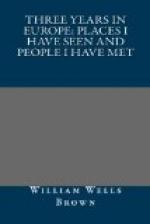Every one appeared to enjoy the holiday which the Royal visit had caused. But the Irish are indeed a strange people. How varied their aspect—how contradictory their character. Ireland, the land of genius and degradation—of great resources and unparalleled poverty—noble deeds and the most revolting crimes—the land of distinguished poets, splendid orators, and the bravest of soldiers—the land of ignorance and beggary! Dublin is a splendid city, but its splendour is that of chiselled marble rather than real life. One cannot behold these architectural monuments without thinking of the great men that Ireland has produced. The names of Burke, Sheridan, Flood, Grattan, O’Connell, and Shiel, have become as familiar to the Americans as household words. Burke is known as the statesman; Sheridan for his great speech on the trial of Warren Hastings; Grattan for his eloquence; O’Connell as the agitator; and Shiel as the accomplished orator.
But of Ireland’s sons, none stands higher in America than Thomas Moore, the Poet. The vigour of his sarcasm, the glow of his enthusiasm, the coruscations of his fancy, and the flashing of his wit, seem to be as well understood in the new world as the old; and the support which his pen has given to civil and religious liberty throughout the world, entitled the Minstrel of Erin to this elevated position.
Before leaving America I had heard much of the friends of my enslaved countrymen residing in Ireland; and the reception I met with on all hands while in public, satisfied me that what I had heard had not been exaggerated. To the Webbs, Allens, and Haughtons, of Dublin, the cause of the American slave is much indebted.
I quitted Dublin with a feeling akin to leaving my native land.
LETTER III.
Departure from Ireland—London—Trip to Paris—Paris—The Peace Congress: first day—Church of the Madeleine—Column Vendome—the French.
PARIS, August 23.
After a pleasant sojourn of three weeks in Ireland, I took passage in one of the mail steamers for Liverpool, and arriving there was soon on the road to the metropolis. The passage from Dublin to Liverpool was an agreeable one. The rough sea that we passed through on going to Ireland had given way to a dead calm, and our noble little steamer, on quitting the Dublin wharf, seemed to understand that she was to have it all her own way. During the first part of the evening, the boat appeared to feel her importance, and, darting through the water with majestic strides, she left behind her a dark cloud of smoke suspended in the air like a banner; while, far astern in the wake of the vessel, could be seen the rippled waves sparkling in the rays of the moon, giving strength and beauty to the splendour of the evening.




